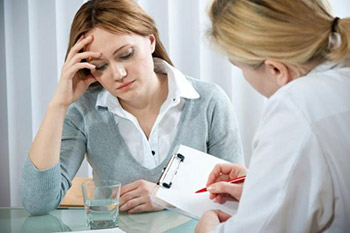 According to statistics, more than 50% of all IVF procedures are unsuccessful. Such indicators are considered quite natural, since even in the natural cycle, not all women manage to get pregnant the first time. Unsuccessful IVF is not a reason to get upset and give up. Due to their extensive work experience and high qualifications, reproductive specialists of the K + 31 clinic often achieve the desired result when re-treating infertility.
According to statistics, more than 50% of all IVF procedures are unsuccessful. Such indicators are considered quite natural, since even in the natural cycle, not all women manage to get pregnant the first time. Unsuccessful IVF is not a reason to get upset and give up. Due to their extensive work experience and high qualifications, reproductive specialists of the K + 31 clinic often achieve the desired result when re-treating infertility.
Failed IVF attempt
More than 35% of women who have undergone IVF cannot get pregnant on the first IVF attempt . The highest percentage of failed IVF attempts occurs in patients who have used assisted reproductive technologies (ART) for the first time. It is also known that even after several IVF attempts, many couples suddenly conceive a child in the natural cycle and become parents.
The ineffectiveness of the protocol carried out in most cases indicates the presence of serious deviations in the functioning of the woman's reproductive system. It is the physiological obstacles to conception and bearing of the fetus that most often cause unsuccessful IVF attempts.
Often, women do not take seriously the recommendations of reproductive specialists regarding the regimen after the final stage of ART. The specialists of the K + 31 clinic advise their patients at the stage of pregnancy planning and after IVF. The discipline of expectant mothers increases the chances of implantation of embryos in the uterus and pregnancy several times.
Reasons for failed IVF
 Psycho-emotional depression is one of the most negative consequences of the first failed IVF attempt. It is the problems in the mental sphere in the future that can become an obstacle to conceiving a child with repeated attempts. Reproductive specialists and psychologists at the K + 31 clinic closely monitor the physical and mental health of their patients. This allows you to accurately determine what exactly went wrong and eliminate the problem in the next IVF protocol.
Psycho-emotional depression is one of the most negative consequences of the first failed IVF attempt. It is the problems in the mental sphere in the future that can become an obstacle to conceiving a child with repeated attempts. Reproductive specialists and psychologists at the K + 31 clinic closely monitor the physical and mental health of their patients. This allows you to accurately determine what exactly went wrong and eliminate the problem in the next IVF protocol.
As noted, luck after the first eco attempt is rare. The probability of conception in the first protocol usually does not exceed 40%.
Signs of failed IVF:
- physiological unpreparedness of the body for conception;
- age and household factors;
- genetic and cellular abnormalities;
- deontological and iatrogenic factors.
Each of the above categories of reasons has its own characteristics. In most cases, they can be eliminated with the help of drug treatment, adherence to the regimen and a professionally drawn up ART plan.
Physiological causes
 In 73% of cases, unsuccessful IVF is the result of insufficient preparation of the mother's body for conception. Reproductive system dysfunctions are one of the key causes of infertility. The physiological reasons for the failure of ART include:
In 73% of cases, unsuccessful IVF is the result of insufficient preparation of the mother's body for conception. Reproductive system dysfunctions are one of the key causes of infertility. The physiological reasons for the failure of ART include:
- pathological changes in the endometrium;
- autoimmune disorders;
- hormonal disruptions;
- fallopian tube pathology;
- ovarian wasting syndrome;
- lack of response to hormone therapy;
- hidden infections.
Violation of the menstrual cycle and insufficient levels of steroid hormones in the blood leads to the fact that the embryo cannot be implanted into the wall of the uterus. As a consequence, this leads to an unsuccessful IVF outcome.
Household and age reasons
 With age, the reproductive activity of the body fades away, and therefore the chances of conception in the IVF protocol decrease. Often the reason for unsuccessful artificial insemination is:
With age, the reproductive activity of the body fades away, and therefore the chances of conception in the IVF protocol decrease. Often the reason for unsuccessful artificial insemination is:
- the age of the patients after 40-45 years;
- Unhealthy Lifestyle;
- difficult microclimate in the family;
- overweight;
- non-compliance with medical recommendations;
- addictions.
Patients should understand that after IVF it is undesirable to contact with people around and expose themselves to excessive physical and psycho-emotional stress. In the first 14 days after the procedure, this can lead to a pregnancy failure or fetal freezing.
Cellular and genetic abnormalities
The first unsuccessful IVF may be the result of insufficient quality of the biomaterial used during the procedure:
- poor quality of oocytes and sperm;
- insufficient viability of embryos;
- chromosomal diseases.
If the reason for the failure was the low quality of male or female gametes, reproductive specialists and embryologists at the K + 31 clinic prescribe hormone therapy to patients. Its passage contributes to the normalization of spermatogenesis in men and the menstrual cycle in women.
Deontological and iatrogenic causes
 Pregnancy may not occur due to insufficient professionalism of doctors and poorly performed manipulations. It should be understood that the probability of conception after IVF largely depends on the literacy of the IVF protocol drawn up and the level of professionalism of the specialists. An important role in this is played by the quality of the used diagnostic and laboratory equipment.
Pregnancy may not occur due to insufficient professionalism of doctors and poorly performed manipulations. It should be understood that the probability of conception after IVF largely depends on the literacy of the IVF protocol drawn up and the level of professionalism of the specialists. An important role in this is played by the quality of the used diagnostic and laboratory equipment.
Reproductologists, andrologists and other specialized specialists with extensive experience work in the K + 31 clinic. They use expert medical equipment to determine the causes of infertility in couples. In vitro fertilization of oocytes with spermatozoa is carried out in a modern laboratory, due to which the viability of the resulting embryos increases significantly.
What to do next?
After the first IVF attempt, married couples should not become discouraged or discouraged. The first failure does not yet indicate the impossibility of conceiving a child in subsequent protocols. The first thing a spouse should do after IVF is to calm down and start planning for a repeat IVF attempt.
 To increase the chances of success, the specialists of the K + 31 clinic recommend:
To increase the chances of success, the specialists of the K + 31 clinic recommend:
- take into account the mistakes that were made last time;
- undergo re-examination and hormonal therapy;
- normalize diet and give up addictions;
- restore the menstrual cycle and stabilize the psycho-emotional background.
To restore the body after IVF, physiotherapeutic procedures can be used - acupressure, hydrotherapy, mud therapy, etc. All this contributes to the normalization of the functions of vital organs and the reproductive system, thereby increasing the likelihood of a successful IVF outcome.
Analyzes after unsuccessful IVF
After an unsuccessful IVF protocol, it is imperative to find out the reasons for the failure, take tests and undergo examinations. Many experts recommend that in order for pregnancy to occur after an unsuccessful IVF, it is necessary to change the treatment regimen and adjust the ovarian stimulation protocol.
After unsuccessful IVF, the following tests are prescribed:
- Antibodies to hCG;
- Blood test for antiphospholipid antibodies;
- Serum blocking factor;
- Karyotype;
- Blood test for lupus anticoagulant.
To exclude endometrial diseases, the specialists of the K + 31 clinic recommend undergoing hysteroscopy. The structure and size of which, to a greater extent, affects the successful transfer of the embryo.
Unfortunately, in addition to problems with the endometrium, there are many more factors that can affect the outcome of IVF, among them:
- Hormone problems;
- Overweight;
- Pathology of the fallopian tubes;
- Genetic and immune pathologies.
The tests after unsuccessful IVF will help to most accurately identify the problem and increase the chances of subsequent protocols. The main thing to remember is the emotional state. You cannot despair and give up, a positive attitude, faith in a successful outcome and strict adherence to all the recommendations of specialists will definitely give a positive result!
